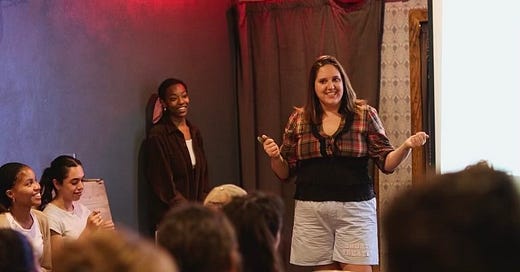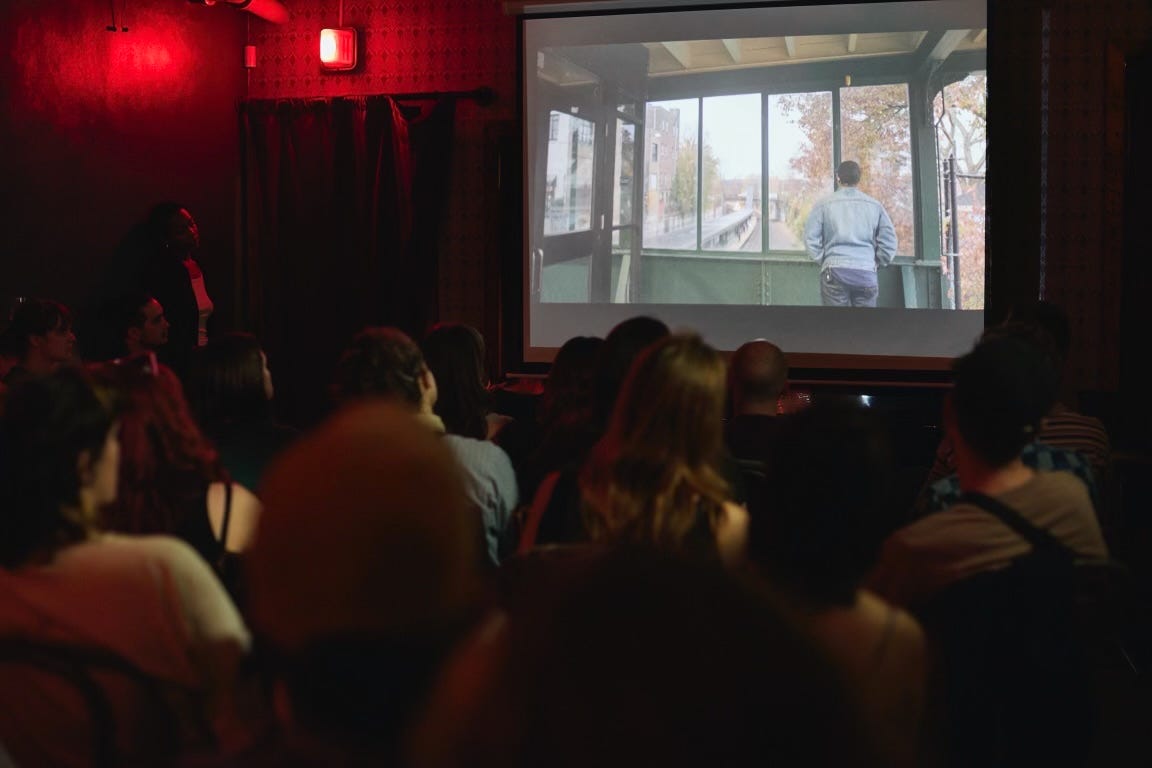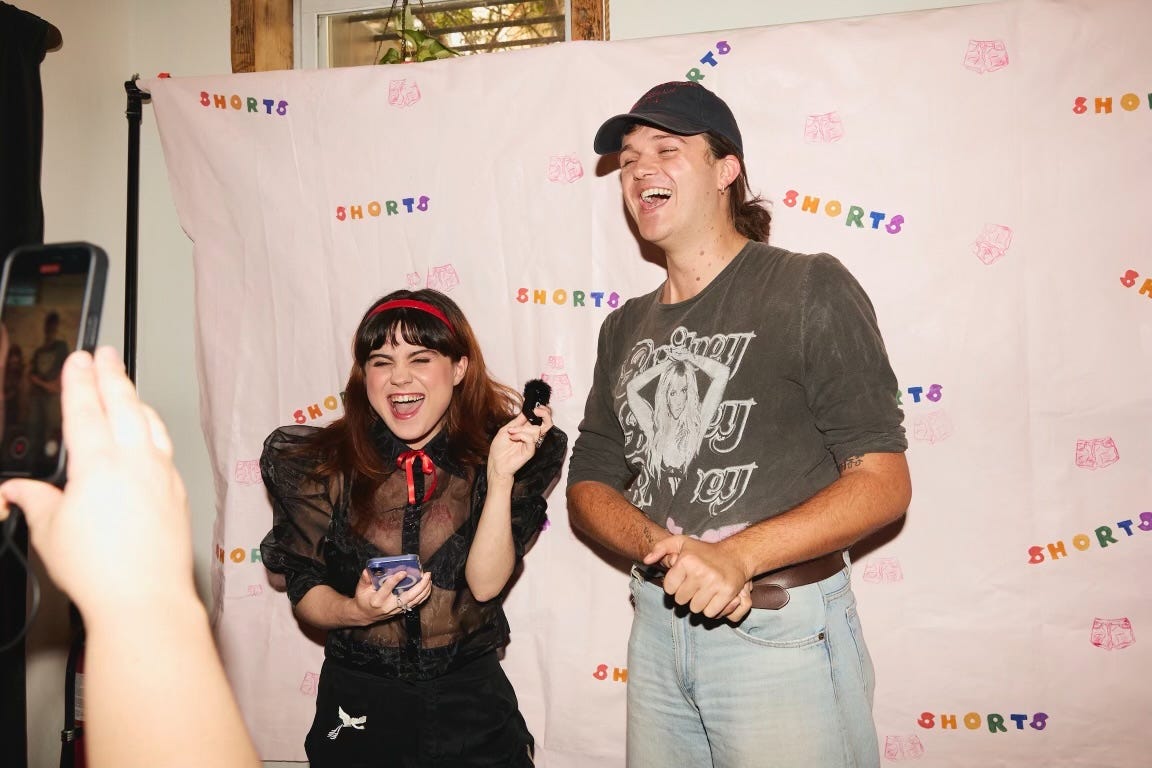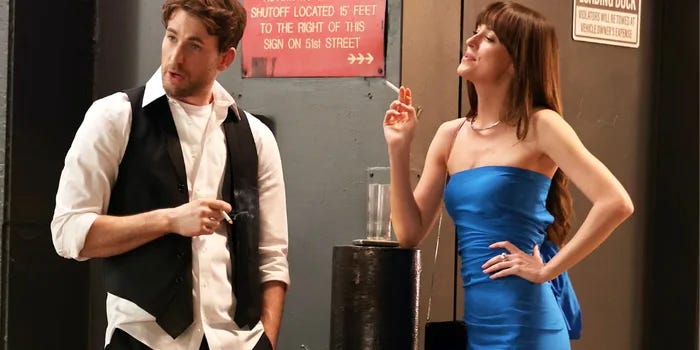Coming Soon: A New Venue for Short Films
Karma Masseli discusses Shorts Movie Theater; plus, are the filmmaking choices in 'Materialists' effective?
Exciting news from Nothing Bogus HQ! Things are changin’ round these parts. I’m talkin’ format. We’re experimenting with several new segments. You will love them. So much, I hope, that you consider taking the $5 you might spend on a single coffee and putting it towards a month’s worth of A+ emails from your favorite newsletter. Every bit of support means a lot, and ultimately it makes this thing possible.
OPENINGS
It’s a Bar?… It’s a Theater?… It’s Shorts Movie Theater!
“This feels like a project about designing a space for more people to form a relationship with the art of going out [and] and watching something together.”
by Sasha Linden Cohen
What happens after you finish making a short film? Maybe you send around a Vimeo link. Maybe you host a screening at a bar. Maybe, if you’re lucky, it lands on the festival circuit. More often, it sits quietly online, gathering digital dust as you move on to the next.
Karma Masseli wants to give these films a home. The filmmaker and theater director — who was a founding member of the Fort Greene restaurant Dinner Party — is gearing up to launch Shorts Movie Theater, the first brick-and-mortar cinema in the U.S. dedicated entirely to short films. Set to open in early 2026, the non-profits arts venue wants to carve out space for a format long treated as either a stepping stone or an afterthought — despite its growing popularity online and on the festival circuit. Her hope is to create a sort of bar-theater hybrid, a venue where people can pop in for five-to-fifteen-minute films the same way they might grab a drink or see a bit of live music.
Ahead of its official launch next year, Masseli has begun hosting a series of pop-up screenings, the first of which, dubbed “Gorts” (Gay Shorts), took place on June 3rd at Threes Brewing, in Gowanus. Her team rolled out a red carpet, set up a merch stand, and even used intermissions between each film to make an extremely short film (about a minute long) with the help of the audience — a gimmick which certainly ran the risk of not landing, but ended up being pretty charming. The next screening will be held on June 22 at 7:00 PM at Pine Box Rock Shop.
Following the kick-off event, we discussed Masseli’s vision — and why she thinks it’s time short films got their own stage.
Tell me about the impetus for this idea.
It feels like this is the most obvious thing ever. We are all watching short form content all the time. Why shouldn't there be a theater space where we can bring that audience viewing habit into a shared environment so that we can benefit from all the things that a shared cultural space [offers]? This feels like a project about designing a space for more people to form a relationship with the art of going out [and] and watching something together.
There's people I've talked to who are like, “no one watches short films.” And I'm like, “what do you think we're doing all the time on our phones?”
Not to be a stick in the mud, but what would you think of the idea that we should be training our minds to be able to have [longer] attention spans?
[To] that I just say, “absolutely.” But in the time it takes to grow our attention spans back, we're gonna lose people from the practice of going into a neutral shared space and experiencing something together. And it's more important that they do that than they watch something that's long or short.
You know when you go into a Broadway theater and everybody there is eighty? It's not just because people in their eighties love theater or people in their eighties can afford theater. It's because in the twentieth century, American regional theaters around the country offered extremely low cost memberships to young couples in their twenties. Like really, really cheap. The thinking there is that they're investing in a future patron. They built their audience base by investing in them when they were young and impressionable because you have to fall in love with something if you're gonna wanna support it and be a part of it.
We have to do that. We have to invest in them, which means giving them something that they want. That way, they build the habit and the love of being in a shared space.
So I know before this past year you had mainly worked as a theater director. What’s that transition been like?
In theater, you have a connection with your audience really early on in your career. As an early career filmmaker, I made two shorts and I was like, “Wait a second. Where's the audience in all of this?” You might show it once, but it's so different from a play where you work towards a production. With film, it's like you make the work and then it's this question mark. Where do those shorts go?
Building the skill of connecting with your audience is so important. Showing your work and being like, “Did they like this? What does it feel like to waste their time?” When you make a decision that only serves your own creative vision and then you see your audience get bored by it… to experience the embarrassment in real time — I think that's an important learning experience.
What about the money side of things? You’re still in the process of incorporating as a non-profit and there’s not really a model for this type of venue, so tell me about the business plan.
One really exciting thing about Shorts is [that] it's like such a wild west of opportunity because there is no major, standardized system of how shorts get used. That’s what makes the business model possible. For this event, I just asked the filmmakers by finding their emails, “Can we play it?” And they all said yes. The bet I'm making here is that we can get some of the best shorts that exist by just reaching out and saying, “We love your movie, we want audiences to see it.” Whereas with a feature film, you are locked up into a lot of studio deals where the rights are taken.
So that makes it easier on the back-end. How will it work for the customers?
The tickets will be priced by the length. You can come in and see a twelve minute movie and it'll cost you four or five dollars. We're still monetizing that seat at the same rate that a regular movie theater would — a hundred minutes in that seat would still cost you twenty dollars — but we're splitting it up into these chunks. And you can go in and out, get a drink at our wine bar between movies. We’ll pay the filmmakers a cut, but we can keep a larger percentage of that ticket sale than a normal movie theater is able to because they're paying it back to the studio.
And so my hope is that we're actually an art space that is operating off of its earned income and not just its contributed income, which is a very rare thing in the nonprofit world. There are not many cultural spaces that operate that way.
Sasha Linden Cohen is a journalist and producer based in Brooklyn.
HOT TICKETS
New York: June 16 - 23
Dark Room and Film Coop are collaborating on a showing of rarely screened 16mm prints of some of their favorite films. There will be a live score. June 17, 7:00 PM, 475 Park Ave South, 6th floor.
And there’s a lot of cool stuff happening this month for Pride:
Nitehawk is hosting Fix Your Hearts or Die: A Trans Cinema Celebration. This week’s screenings include Keyboard Fantasies: The Beverly Glenn-Copeland Story, T-Blockers, and Holy Trinity.
Museum of Moving Art is hosting Queer and Uncensored. This week there will be several short blocks, which include films such as Leather Narcissus and Flaming Creatures.
And Quad is hosting Pride on Film. This week’s screenings include Sunday Bloody Sunday, Cruising, Fox and His Friends, Cabaret, The Bitter Tears of Petra von Kant, and My Own Private Idaho.
SOMETHING BOGUS
Materialists: That’s Not Amore
I’m always especially intrigued to see what a director does with their second film. Often, they’re working with more resources. Inevitably, they have more know-how. And I like seeing what patterns emerge — around thematic interests, performance, tone, visual style, and overall voice.
And I’m all the more curious when I’ve had mixed feelings on a director’s first feature, as I did with Celine Song’s Past Lives (2023). I thought that film posed interesting questions, but left its characters thinly sketched, and the romantic chemistry between the film’s star-crossed lovers, Nora and Hae Sung, didn’t match the movie’s demands. So I was eager to see how Song’s new film, Materialists, would compare.
Keep reading with a 7-day free trial
Subscribe to Nothing Bogus to keep reading this post and get 7 days of free access to the full post archives.








